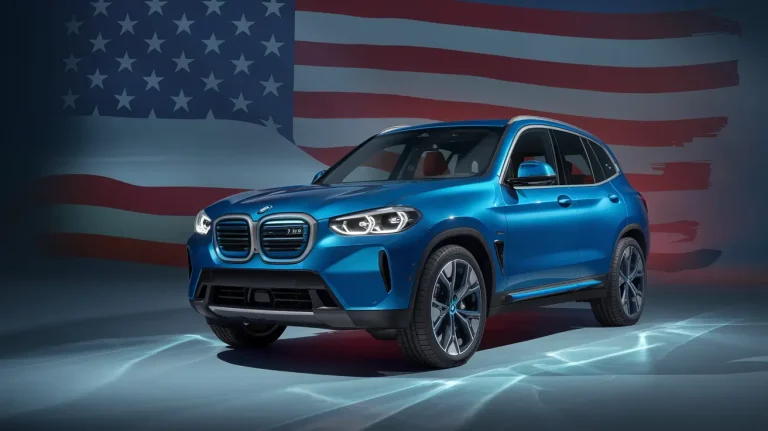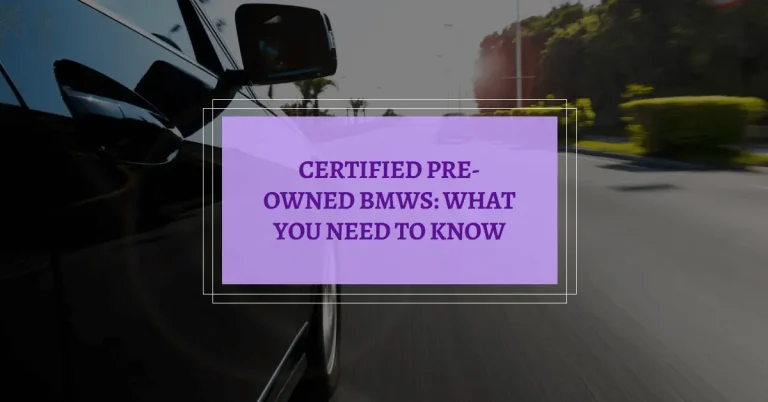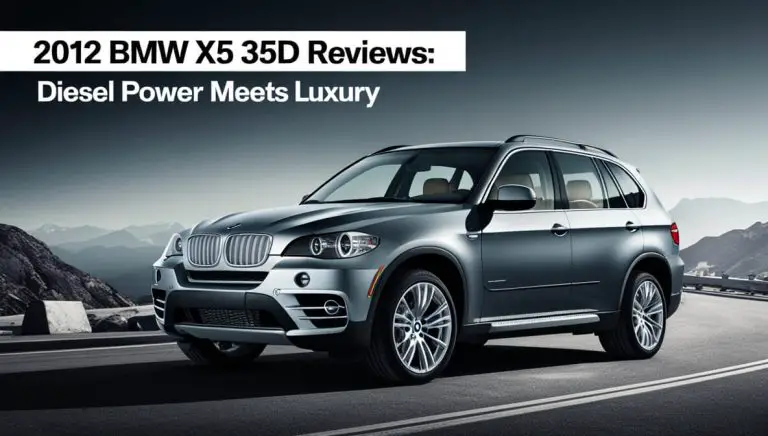What Is the Fastest BMW? A Guide to BMW’s Top Speed Models
Since its founding in 1917, BMW has pursued a passion for performance and speed. Over the decades, BMW’s famed M division has produced some of the world’s fastest and most capable street-legal production cars. But what is the fastest BMW ever made?
The fastest production BMW currently is the M5 CS sedan, with a limited top speed of 190 mph.
In this post, we’ll explore the origins of BMW’s obsession with speed. We’ll take a chronological tour through BMW’s history to highlight the fastest M cars from each era. Finally, we’ll reveal the fastest production BMW models and look to the future of BMW performance. Read on to learn all about the history of BMW’s fastest street-legal rockets.
The Beginnings of BMW Performance
BMW’s roots in performance driving stretch back to the 1930s when the 328 sports car dominated road races across Europe. After World War II, BMW struggled financially but maintained its focus on building engaging driver’s cars like the 507 roadster and the ambitious but underpowered 501 luxury sedan.
However, BMW did not seriously pursue high-performance street cars until the formation of BMW Motorsport GmbH in 1972. Later renamed BMW M, this division developed some of BMW’s most legendary performance cars.
BMW M1 (1978-1981)
The M1 coupe was the first road car developed by the BMW M division. Powered by a 277 hp inline 6-cylinder engine, the mid-engine M1 could reach a top speed of 162 mph.
Only 456 examples were produced, but the M1 cemented BMW’s reputation for combining road car usability with serious racing performance. On the track, the M1 dominated sports car racing in the late 1970s.
E28 BMW M5 (1984-1988)
In the mid-1980s, BMW made history by taking its robust E28 5 Series sedan and injecting brute performance.
The first M5 produced 256 horsepower from its 3.5L straight-6 engine. With a top speed of 155 mph, it was the fastest production sedan in the world.
This high-performance “wolf in sheep’s clothing” concept led to the M5 becoming an icon. It set the blueprint for combining practical 4-door transportation with serious sports car acceleration and handling.
The 1990s: New Speed Records
The 1990s brought a massive jump in performance across BMW’s lineup. New M engine and chassis developments allowed BMW to shatter its own speed records repeatedly through the decade.
E34 BMW M5 (1988-1995)
The second generation M5 (E34 chassis) ramped up power significantly. Its 3.6L straight-6 produced 315 hp, enabling a 0-60 mph time of just 5.9 seconds. It could reach an electronically limited top speed of 155 mph.
In 1992, BMW made history by breaking the production car speed record at Italy’s Nardo test track. An E34 M5 reached a staggering 212 mph after having its speed limiter removed. This brought intense publicity to BMW’s performance achievements.
E36 BMW M3 (1992-1999)
The first M3 based on the 3 Series (E36) arrived in 1992 with a new 3.0L straight-6 pushing 286 hp. Performance reached a new benchmark with 0-60 mph in 5.5 seconds along with a drag-limited top speed of 155 mph.
To meet racing regulations, BMW produced the roadgoing M3 GT homologation special in 1994. Lightweight construction and a revised 295 hp engine enabled a 174 mph top speed.
McLaren F1 BMW V12 (1992-1998)
BMW attained the ultimate speed crown by partnering with McLaren to develop the revolutionary F1 supercar.
Powered by a BMW 6.1L V12, the F1 could reach 240 mph, making it the fastest production car ever built for many years.
The F1 cemented BMW’s reputation at the pinnacle of high-performance engine building. Its 627 hp V12 could propel the F1 from 0-60 mph in just 3.2 seconds.
The 2000s: New M Cars Smash Records
In the 2000s, a new generation of M engines enabled BMW to take speed and performance to unprecedented levels inultra-high-end supercars. While not mass production vehicles, they demonstrated BMW’s pursuit of maximum power and speed.
BMW M3 CSL (2003)
With 360 hp from its 3.2L straight-6, the lightweight M3 CSL coupe reached 60 mph in 4.7 seconds with an electronically limited top speed of 173 mph. BMW produced only 1,400 examples for worldwide sale.
BMW M5 (2005-2010)
The 4th gen M5 (E60) shocked the world with its Formula 1-derived 5.0L V10 producing 507 hp. It could reach 200 mph with an optional top speed package.
BMW M3 GTS (2010)
BMW produced only 135 track-focused GTS models. With a 4.4L V8 from the M3 CRT limited edition, the GTS generated 450 hp. It matched the M3’s top speed of 174 mph.
BMW M1 Homage Concept (2008)
This one-off concept car unveiled at the Concorso D’Eleganza in Italy presaged BMW’s future design language while paying homage to the 1978-81 M1 supercar.
Powered by a modified version of the M5’s V10 making 560 hp, the Homage Concept reached an estimated top speed of 200+ mph.
Modern Day: BMW M Performance Peaks
Moving into the 2010s, BMW M has produced some of its most extreme high-performance cars to date. Leveraging turbocharging and new chassis technologies, BMW has steadily increased the limits of grip, acceleration, and top speed capabilities.
BMW M5 (2012-2018)
The F10 M5 featured a twin-turbo V8 generating 560 hp. It matched the limited top speed of its V10 predecessor at 190 mph.
BMW M3 & M4 (2014-2020)
The turbocharged straight-6 engines in the current M3 and M4 produce 425 hp in base trim. An optional Competition Package raises output to 444 hp and max speed to 174 mph.
BMW M5 (2018-Present)
The current F90 M5 is BMW’s quickest and most capable super sedan. Its 4.4L twin-turbo V8 generates 600 hp in base form and 617 hp in Competition spec. It’s capable of 190 mph flat out.
BMW M8 (2020-Present)
As BMW’s flagship performance model, the M8 coupe and convertible achieve 0-60 mph in 3.0 seconds thanks to 617 hp from their V8 engines. Top speed is limited to 189 mph.
The Fastest Production BMWs Ever Made
We’ve covered key milestones in BMW performance history. Now let’s highlight the current speed kings in BMW’s production lineup:
BMW M5 CS (2021-Present)
The M5 CS represents the pinnacle of BMW performance sedans with 627 hp from its 4.4L twin-turbo V8. It accelerates from 0-60 mph in just 2.9 seconds. More importantly, BMW has raised the limited top speed to 190 mph, making it the fastest production BMW ever.
BMW M8 Competition Coupe/Convertible (2020-Present)
Sharing the same V8 as the M5 CS, the M8 Competition puts out 617 hp and rockets from 0-60 in 3.0 seconds dead. Top speed is electronically limited to 189 mph.
BMW M5 Competition (2018-Present)
The M5 Competition also benefits from the 617 hp twin-turbo V8. 0-60 mph takes just 3.1 seconds on the way to its governed top speed of 189 mph.
The Road Ahead: Electric Performance
BMW is forging ahead into an electric future with next-gen models like the i4 M50. This electric sport sedan generates 536 hp enabling 0-60 mph in 3.7 seconds. Top speed is limited to 140 mph.
While battery-powered BMWs won’t reach the top speeds of V8 or V12 gas engines, their instant electric torque provides jaw-dropping acceleration. BMW will continue to blend electrified powertrains with their world-renowned driving dynamics.
The search for ever-higher top speeds continues. We soon may see ultra-exclusive BMW halo cars that aim to exceed the 200 mph mark. But for now, the BMW M5 CS retains its spot on the throne as the fastest production BMW ever made.
Conclusion
Since its founding over 100 years ago, BMW has cultivated an obsession for performance, speed, and driving enjoyment that is baked into the company’s DNA.
Generation after generation, BMW’s talented engineers have achieved remarkable speeds in flagship supercars meant for racing tracks or autobahns, as well as turbocharged production sedans and coupes that owners can drive every day.
The BMW M5 CS and M8 Competition represent the latest achievements in BMW’s long quest for speed. Powerful yet refined, they expertly balance sheer performance with everyday drivability.
For gearheads who demand the ultimate driving machine, the fastest BMWs represent the perfect combination of usable speed, precision engineering, and that intangible sense of emotional excitement that lives at the heart of the BMW brand.







